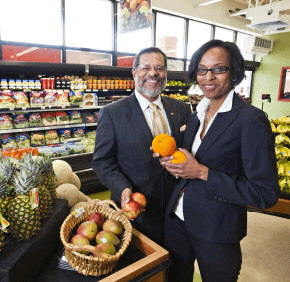By Maria Wiering
mwiering@CatholicReview.org
Twitter: @ReviewWiering
Michael Smith, 59, is mindful to eat vegetables. He buys them canned or frozen, and boils them with margarine. Fresh vegetables are rarely in his kitchen. The Waverly resident doesn’t know how to season them, he said, and doesn’t recognize everything stocked in the produce aisle.
That will change this summer when he participates in a new Franciscan Center initiative to give food-insecure city residents access to fresh vegetables and the tools and knowledge necessary to prepare them.
The project is among several new Baltimore City enterprises aimed at improving nutrition and health for low-income and under-resourced Baltimoreans through better access to fresh fruits and vegetables.
A Baltimore City human services organization founded by the Sisters of St. Francis, the Franciscan Center has partnered with United Way of Central Maryland and other organizations to offer weekly allotments of fresh produce from One Straw Farm near White Hall to 30 individuals and families.
The program, called Fresh Harvest Community-Supported Agriculture Project, launched May 6. Smith, who receives assistance from the Franciscan Center, said he hopes eating more fresh vegetables helps him lose weight and lower his cholesterol.
“My sugar level is high and my sodium level is high,” he said. “The doctor says you’ve got to start eating better, so this door opened up (at the Franciscan Center) … and I said I’m not going to ignore this.”
The Franciscan Center plans to provide cooking classes, recipes and some basic kitchen tools to the produce recipients. In return, recipients have agreed to report how they use the fresh produce, so program organizers can assess how to meet food-insecure people “where they are,” said Meg Ducey, the Franciscan Center’s director of development and marketing.
Food preparation classes are also offered on North Avenue at Apples & Oranges Fresh Market, which opened in March.
The grocery is a longtime goal of Erich March, a funeral director at Baltimore-based March Funeral Homes and president of the East North Avenue Community Development Corporation. Operated by March’s wife, Michele Speaks-March, it is designed to be an oasis in one of Baltimore City’s food deserts.
Baltimore City uses several indicators to define a “food desert,” a place with limited access to fresh food, including distance to the nearest supermarket, average income levels and transportation access. According to these measurements, developed through the Johns Hopkins Center for a Livable Future, one in five Baltimore City residents live in food deserts.
Erich March, 61, said North Avenue – a central East-West corridor – lost its groceries and other anchor stores after the 1968 riots following the assassination of Dr. Martin Luther King Jr. With no supermarket in sight, North Avenue’s residents became accustomed to eating fast food and packaged convenience snacks, March said. Poor diets have taken a toll on their physical and mental health, he said.
“I’m a funeral director. I see the everyday effects of poor diet – obesity, diabetes, hypertension, premature death,” he said. “I’m very conscious of the disparities, and it’s all about diet.”
A parishioner of St. Ann in Baltimore, March hopes the fresh food available at Apples & Oranges will inspire people to cook nutritious meals at home and improve their health, but he expects it may take a long time to change bad habits.
Across the city, New All Saints in Liberty Heights recently marked a milestone in its efforts to improve Northwest Baltimore’s access to healthy food. Parish leaders collaborated with the city and community organizations in a multi-year effort to bring a new supermarket to its neighborhood after a local Super Pride closed 14 years ago. Its pastor, Father Donald A. Sterling, gave a blessing at the May 7 groundbreaking for a ShopRite expected to open next year.
Faith-rooted fresh food
Making fresh produce available for food-insecure populations is a priority for the Archdiocese of Baltimore, which has recently partnered with First Fruits Farm in Freeland, a Christian nonprofit that grows fresh fruits and vegetables for hungry people across the mid-Atlantic. The farm is working 25 acres of archdiocesan-owned land across from the Monsignor O’Dwyer Youth Retreat House in Sparks.
In Baltimore, the Franciscan Center and Catholic Charities’ Our Daily Bread are among the charitable organizations and programs that benefit from First Fruits Farm’s produce.
Groups using the retreat center will have the opportunity to work on the farm, said Mike Downes, the retreat house’s administrator.
Learn about how the new community garden at Ss. Philip and James in Charles Village is serving the poor through a Johns Hopkins initiative, and how your parish can get involved.
Copyright (c) May 10, 2013 CatholicReview.org


